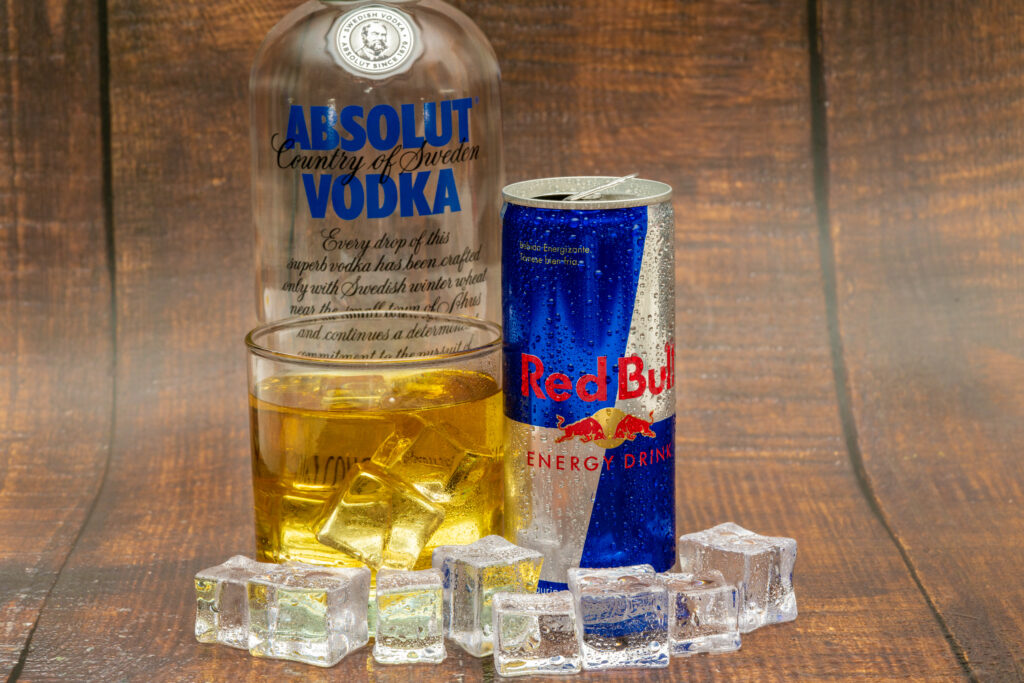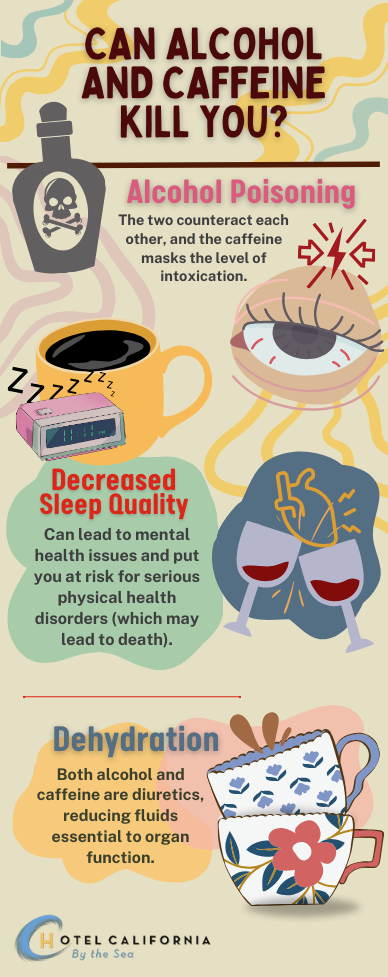Can Alcohol and Caffeine Kill You?
Rum and Coke. Irish coffee. Jagerbombs. Vodka Red Bull. Espresso martini. These are all popular drinks that consist of a combination of alcohol and caffeinated beverages. Alcohol and caffeine have been a popular drink combination for decades. Mixing the two can make a person feel like they have increased energy from the caffeine while still enjoying the calming effects of the alcohol. The combination of the two substances can mask the effects of alcohol, making a person feel like they can drink more leading them to become even more impaired. Though the combination of alcohol and caffeine can lead to dangerous outcomes, can it kill you?

Caffeinated alcoholic drinks were all the rage back in the early 2000s. Early products such as Four Loko were popular alcoholic beverages that contained high amounts of caffeine. They were premixed beverages that contained more alcohol than beer and contained more caffeine than a cup of coffee. Some of them also contained other stimulants
These trendy drinks were heavily marketed towards teens and young adults with ads that depicted young people engaging in activities such as action sports or taking on risky behaviors. These drinks were dangerous according to the FTC. The FTC believed the brands targeted young and inexperienced drinkers who did not realize how much alcohol they were consuming because the effects of intoxication were being masked by caffeine. In November 2010, the FDA declared these beverages unsafe and no longer met the safety standards. The warning from the FDA recommended that brands remove caffeine and other stimulants from their products. Today the FDA does not allow companies or brands to sell products containing a mixture of caffeine and alcohol. Despite these drinks no longer being sold and FDA warnings about the dangers of these products, people are still continuing to mix alcohol and caffeine.

The Side Effects of Caffeine and Alcohol
Caffeine is a stimulant substance that increases brain activity and can produce feelings of high energy and thinking clarity. Alcohol is a depressant substance that slows down brain activity and can make it more difficult to think logically and clearly.
Caffeine is a central nervous system stimulant and can help a person overcome drowsiness by suppressing the rise of adenosine levels in the brain. It blocks adenosine receptors to stop the sleepy signals and make you feel more awake. Adenosine builds up in the brain throughout the day acting on the CNS to help the body and brain regulate wakefulness and sleepiness. When it reaches high levels by the end of the day, it tends to make you feel sleepy. When alcohol is introduced, it causes more adenosine to accumulate in the system which causes slowed brain activity. However, when caffeine is introduced, it produces the opposite effect.
The combination of the two can cause extremely opposing effects on the body leading to imbalance and chaotic side effects.
- Caffeine can mask the effects of alcohol – It can make you feel less drunk and have the ability to drink more even when you have already drunk too much.
- Caffeine will make you feel more alert – It will make you feel like you can continue drinking and increase the BAC without feeling the effects.
- Increased risk of alcohol poisoning and overdose – Because the caffeine is masking the sedative effects, you won’t feel drunk and continue to drink more.
- Increased chance of alcohol abuse – The combination of the two drugs can lead to binge drinking because you cannot feel the alcoholic effects being masked.
- Risk of alcohol dependence – When you regularly consume alcohol, you can develop a tolerance, then a dependence and alcohol use disorder.
- You are more prone to making mistakes because despite feeling more alert, the alcohol still impairs performance and cognitive functioning.
- You can experience alcohol-related consequences.
- Cardiovascular damage – The mixture of both substances can lead to cardiovascular damage by increasing heart rate and blood pressure.
- Dehydration – Both caffeine and alcohol cause dehydration, dry mouth, dark urine and feeling dizzy and lightheaded.
- A higher risk for physical injuries, alcohol-impaired driving and unwanted or unprotected sex.
- Excessive weight gain – Alcoholic drinks as well as caffeinated drinks are often mixed in with other sweet additives to try and mask the flavors. They are often loaded with tons of sugar resulting in the consumption of empty calories and weight gain. Alcoholic drinks can range from 100-500 calories. Caffeinated drinks can range from 250-300 calories. The combined of the two substances total an average of 900 calories from one drink.
Check Your Insurance Coverage for FREE
Find out if your insurance covers addiction treatment in minutes. We accept most insurance!
Why are people mixing Caffeine and Alcohol?
- Teens and young people are more prone to mixing caffeine and alcohol due to curiosity and peer pressure
- Caffeine alcoholic drinks in cocktails such as espresso martinis and rum and coke are very popular drinks
- Sweet energy drinks like Red Bull can often mask the taste of alcohol like vodka
- It can make people feel like they can drink more alcohol when they consume both
- Some people think that drinking caffeine after alcohol can help them sober up
- Some people mix because they want to feel relaxed and calm without feeling sleepy so the caffeine helps them stay awake
Can Alcohol and Caffeine kill you?
The combination of alcohol and caffeine cannot kill you. But it can put a person at great risk for health dangers that can eventually lead to death if they become serious enough and are not treated properly. The lack of knowledge of the risks of combining the two substances makes it even more dangerous.
Ultimately, when drinking both together, it can lead to more alcohol intake and make it even more difficult for the liver to process, leading to alcohol toxicity and overdose. When this pattern of drinking is repeated, it can lead to physical and psychological long-term effects including alcohol use disorder.
The caffeine can cover the sedative side effects of alcohol leading to the person to feel energetic enough to continue consuming more. This results in binge drinking, reduced response time, impaired cognitive functions, lack of motor control and higher blood pressure. When it comes down to it, the caffeine will keep you awake and alert longer allowing for more time to drink without feeling the effects and putting you at a dangerous risk of alcohol poisoning.
Can you drink Caffeine after drinking Alcohol?
Most people are under the impression that drinking caffeine after alcohol can help you sober up. That is a myth. The only thing that will help you stay sober is time. Drinking caffeine might make you feel sober because you are more alert and not sleepy or sedated, but ultimately, the alcohol still remains in your body until the liver has processed it. Drinking caffeine after drinking alcohol will have very few benefits.
Reach out to Hotel California by the Sea
We specialize in treating addiction and other co-occurring disorders, such as PTSD. Our Admissions specialists are available to walk you through the best options for treating your addiction.
Treatment for Alcohol Use Disorder
Alcoholic drinks that also contain caffeine can produce dangerous effects on a person especially if they are drinking in excess. Alcohol and caffeine can ultimately lead a person to drink more, develop a tolerance and eventually lead to alcohol addiction. Hotel California by the Sea is a behavioral treatment program with specialties in alcohol use disorder.
We offer treatment at all levels of care including detox, residential, PHP and IOP. In addition, we utilize evidence-based treatment methods such as CBT, DBT and EMDR therapy. Hotel California by the Sea is dedicated to helping our clients overcome their alcoholism and find a healthier life in sobriety.
References:
https://www.cdc.gov/alcohol/about-alcohol-use/alcohol-caffeine.html
https://www.goodrx.com/well-being/substance-use/alcohol-caffeine-energy-drinks-effects
https://www.healthline.com/health/caffeine-and-alcohol
https://pmc.ncbi.nlm.nih.gov/articles/PMC4354945
https://www.self.com/story/effects-of-alcohol-and-caffeine
https://health.clevelandclinic.org/energy-drinks-and-alcohol-a-bad-combination
